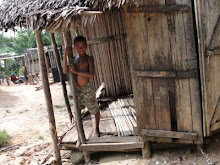Well, Madagascar ALMOST made it through the cyclone season without getting hit. Almost. A few days ago we were hit by a cyclone and the limited reports we are able to get from the coastal regions our project is working in is that the coast has been hit pretty hard.
I was in Antananarivo, or “Tana,” during the storm as I went up with our disaster management director to attend meetings with CARE and CRS about equipment, budgets, and program implementation. We got wind and rain, but we never lost power, so that was a blessing.
Apparently in Ambositra, it was a bit worse. Ben and Gil told me they had a hard time sleeping at night from the noise of the wind and the shaking of the building. There were many leaks in our headquarters building; our hallway was inundated with water, water came through the roof in our kitchen, and apparently our project director’s quarters on the 4th floor were nearly flooded as well. However, our building withstood the storm quite well considering the fact that there are no building codes in Madagascar. Our neighbors in Ambositra were left relatively unscathed as well. Some thatch roofs were damaged and fences blown away, but other than that, things were fine (at least that we knew of). Oh yeah, and our internet modem or cable or something was destroyed so we were without internet FOREVER except for the email and facebook applications I could get on my phone. (This is why I’m posting a flurry of blogs now as our internet just started up and is running, but I’m sure it’ll malfunction over the weekend like it usually does, so I’m throwing these blogs I’ve written over the past couple weeks up on the site really quickly!)
Anyway, back to the cyclone. Apparently on the coast in Mananjary we hear there is quite extensive damage. Many of the homes have been flooded and/ or otherwise destroyed, cell coverage is completely knocked out, and homes and buildings that actually did have electricity are all in the dark now. Roads into the region are all washed out or blocked by massive mudslides.
Many of the project workers who are stationed at the project HQ site in Mananjary were actually up at Ambositra’s headquarters for training when the cyclone hit. Because there really is no functioning early warning system along the coast, or most places for that matter, people were unaware that a cyclone was coming and were hit “without warning” (although I had heard a couple people talk about the cyclone’s impending arrival when I was up in the capital, even there details were very limited). Anyway, because electricity and cell service was knocked out in Mananjary, the project workers who live there were unable to contact their families to see if they were okay or if their homes were still standing. As soon as the storm passed, they tried to drive down to Mananjary, but 37 km before the town, the only road in was blocked by several landslides. After they camped out a night, we received word that they had decided to hike the remainder of the 37 km into Mananjary with their packs to check on their families and homes.
We are all hoping and praying that their families are okay. While many of the buildings in Mananjary should have been able to withstand the cyclone’s winds (we think), we have no idea how high the storm surge went into the town. At this point, the condition of the outlying villages Charly and I spent the last few weeks visiting and discussing disaster management with the commune maires and fokontany chiefs is unknown, although we are pretty sure they sustained heavy damage. It is unlikely that our teams will be able to go into the bush and check the villages out any time soon because the roads are either washed away or otherwise impassable for the time being.
While I feel terrible for everyone on the coast who have been affected by the cyclone, I think it will be good for me to be able to survey the damage to homes, roads, etc. when I next head back down to Mananjary. I think it will give me a better understanding of the challenges these people have to face year after year with these cyclones and will help me to more effectively help design a disaster preparation and mitigation program to be implemented over the course of this project.
Anyway, prayers for the people most affected by this cyclone would be greatly appreciated.
*** We just found out today 3/19 that ADRA is taking the lead in the relief efforts in Mananjary and Nosy Varika districts where thousands of people are without food, water, and shelter. Please also pray that our organization, as well as everyone else involved in the relief effort will be able to effectively and efficiently develop and implement a plan to distribute food, water, and shelter to those most affected by the storm.
Friday, March 19, 2010
Subscribe to:
Post Comments (Atom)

No comments:
Post a Comment